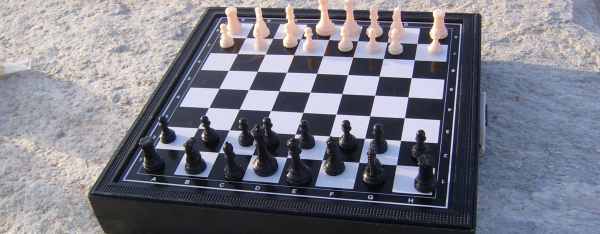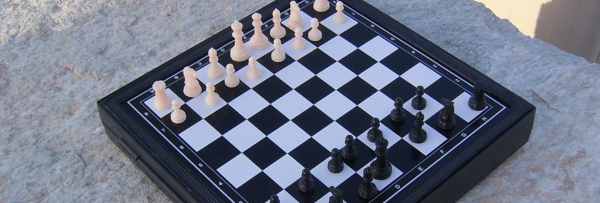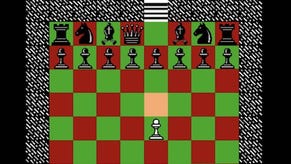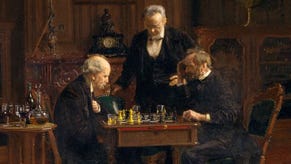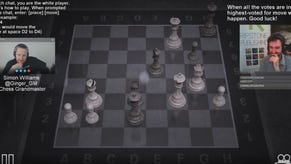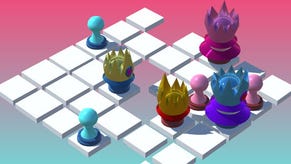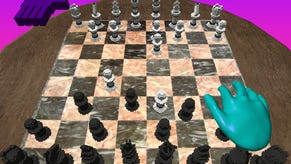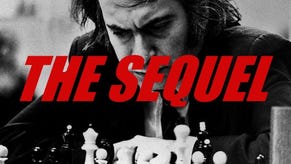7-in-1 Magnetic Family Game: Chess
Chess was invented in 1959 by Mr Chess. It's quite the game.
That running joke first appeared in the pages of the oft-miraculous early-noughties Future PC magazine 101 PC Games (Miraculous because it should have been terrible, but somehow, by dint of the sheer editorial vision of Lee Hall, was actually terribly awesome). One of their pieces of page architecture was a tiny bubble where you had to include a relevant fact to do with the game. Jim and Walker competed to see who could get the most ludicrous "fact" into it. I have no idea whose mind it ejected from - probably Jim's, I suspect - but "Mr Chess invented Chess in 1959" was my favourite. It's a gag which speaks to the station of chess. It wouldn't be nearly as funny as "Mr Ludo" or "Mr Backgammon". It's funny because it's Chess.
In other words, unlike any other game in the box, Chess is an icon. Unlike any other game in the box, it works brilliantly as a videogame - in fact, I'd argue it was one of the first. And unlike any other game in the game, it speaks to videogames - and many of the subtler things which makes Chess compelling to sub-Kasparov intellects are present in many videogames. And, as such, it's the game I'm going to return time and time over in these essays as a point of comparison. In a completely unfair way, note why Chess is Chess and Ludo is not Chess.
Fucking Ludo.
We're getting ahead of ourselves - though worth stressing, by the end of his exercise I want a DEATH TO LUDO movement formed, driven by the proper levels of homicidal fury. Chess was the first game we reached for, set up and dived into. Over our initial moves, we bemoaned our lack of any real strategic knowledge. Somewhat disingenuously, I was doing this while fluffing a four-move mate, which I then explained how I'd fluffed - saying it was about the only early attack I knew - before then twisting it into another mate on similar lines. Which was somewhat cruel, to say the least, and I suspect earned negative karma which helped lead to the string of exciting, crushing defeats that awaited me in the future, on other bloody boards. In the spirit of summer, I took back the final move and played from there, which blossomed into a game which was interesting for the both of us. While I was the slightly more experienced player, by going for such an aggressive opening, I was playing from severe positional weakness, making things really more interesting. And those early gambits gone, I was left with playing chess the way I - and, I suspect, most non-serious chess players play. As in, as a tactical rather than a strategic game.
I don't have the brain to see the moves in the future. So I played knowing the strength of pieces. This series of exchanges leads to me being a bishop up. I play this, it threatens the Queen. If she fucks up, I've got a major edge. In other words, attritional chess. You play until your opponent can't stop you winning the game rather than playing for the win itself. I think, looking across most strategy games, that's the difference between amateurs and the skilled. The memorizing of build orders is really just akin to my silly early checkmates - it's not really skill, at least in a way which is of interest. As you learn, unable to see the conclusion, you play the steps. I mean, that's how we all play RTS, yeah? I mean, us. Not you. You're good. Us. The ones who do okay with our friends but lose when we go wild on the net.
(Still, even with our skills, I was amused to see the personality shining through. My Lady played a wonderfully annoyingly deceptive game. Where my attacks were pretty brutal stomping things, her finest moments elegantly set up strikes with a piece blocking the way, then moved the intervening piece to subtly reveal the threat. Which I probably missed. I vaguely know there's a name for it (Opposite of a pin or something?), but it impressed me. Point being: It's a game where expression was possible, even at lower levels. How people played said something. It was human in a way that - say - playing tic-tac-toe isn't.)
I won though. By brutal steamroller attrition. It felt good. The lady felt good losing. It wasn't just the red wine we found in the flat and drank with little fear. It's a good game, y'know?
But here's a reason you don't often hear when hailing the beauty of chess: It has good graphics.
I was always somewhat enchanted by chess. Part of it is the monolithic cultural part of it - the cold-war proxy of the Fischer/Russians 70s and all that - but it's a game which works as decoration as much a game. My parents, late in our childhood, brought a fancy board. As far as I'm aware, it's never been played with. Who cares? It's beautiful. But, relevantly to videogames, its beauty is one which adds drama and meaning to it. It bears no relation to any battle that has ever been fought, its interactions as abstract as possible - but they become visceral and emotionally meaningful just by the shape of the pieces and the names they carry. They are more than their ludic content - they represent something else, they inspire, they ask us to create narratives from.
Walker, when playing DS Game Slitherlink, talked about how he started to personalise the numbers of the game:
"More peculiar is the anthropomorphism I've developed when I view the numbers. Numbropomorphism as someone suggested (I rudely forget who, so fail to award credit). 3s are greedy, boisterous, and definitely male. They bully the other numbers, barging their way through queues and spilling pints. 2s are the very opposite, prim and polite, sensible, and certainly female. They are business-like, efficient and tidy, but remarkably clever. They tolerate the 3s, but find the 1s tiresome. And indeed the 1s are tiresome. Needy cowards, they feebly sit in the way, refusing to help."
Walker describes it as madness. I say that madness is part of almost every modern videogame we play, and we don't notice because the steps are eased by the graphics. Even with chess, in seconds we're aware of a knight and bishop's personality. The point of any kind of non-abstract representation in a game is to do that, and to elevate the rules. Jim used to say "Graphics over Gameplay" to upturn the oft-stated truism and argue that graphics are gameplay - and in a real way, without a visual part of the game, the game is unplayable (Bar solely sound-based games, of course). Chess shows that graphics elevate a game, even on the most basic level of play. Pawns, Knights and Queens are more fun than pieces 1, 2 and 4.
Good work, Mr Chess.


